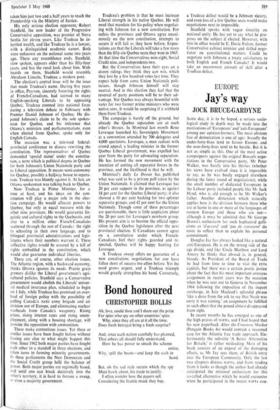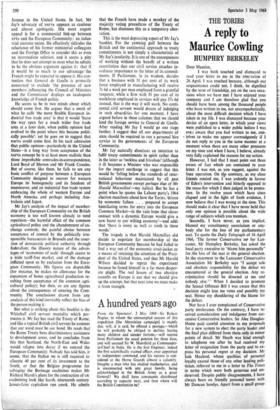Jay's way
EUROPE JOCK BRUCE-GARDYNE
Some day, it is to be hoped, a serious socio- logical study in depth may be made into the motivations of 'Europeans' and 'anti-Europeans' among our opinion-formers. The most obvious line of demarcation is one of age: broadly the under-forty-fives tend to favour Europe, and the over-forty-fives tend to be hostile. But it is not as simple as this. One of the most active compaigners against the original Brussels nego- tiations in the Conservative party, Mr Peter Walker, was barely into his thirties (whether his views have evolved since it is impossible to say, as he was busily engaged elsewhere during the latest round of negotiations), while the small number of dedicated Europeans in the Labour party included people like Mr Jack Hynd, who is old enough to be Mr Walker's father. Another dimension which naturally applies here is the division between those who are at home in one or more of the languages of western Europe and those who are not— although it must be admitted that Mr George Brown's enthusiasm for such haphazard galli- cisms as `d'accord' and 'pas de comment' do more to reflect than to explain his personal commitment.
Douglas Jay has always looked like a natural anti-European. He is on the wrong side of the age divide, and like Uncle Matthew and Lord Amory he thinks that abroad is, in general, bloody. As President of the Board of Trade he had from time to time to visit the EFTA capitals, but there was a certain poetic justice about the fact that his most important overseas assignment in recent years was the occasion when he was sent out to Geneva in November 1964 following the imposition of the import surcharge, in Jain Macleod's splendid phrase 'like a dove from the ark to say that Noah was sorry it was raining,' an assignment he fulfilled to such effect that the pound almost disappeared from sight.
In recent months he has emerged as one of the high priests of NAFTA, and I had hoped that his new paperback After the Common Market (Penguin Books 4s) would contain a reasoned case for the Atlantic free trade approach. Un- fortunately the sub-title 'A Better Alternative for Britain,' is rather misleading. Most of his book consists of an exposé of the damaging effects, as Mr Jay sees them, of British entry into the European Community. Only the last two chapters discuss NAFTA, and from reading them it looks as though the author had already anticipated the minimal enthusiasm for this so-called alternative which he would encounter when he participated in the recent NAFTA con- ference in the United States. In fact, Mr Jay's advocacy of NAFTA appears as cautious and almost apologetic. His most cogent appeal is for a commercial link-up between EFTA and the European Community: an indus- trial customs union. He effectively ridicules the reluctance of his former ministerial colleagues and the Foreign Office to consider this as even an intermediate solution, and it seems a pity that he does not attempt to meet what he admits to be the obvious argument against it: that if it would be so much to our advantage' the French might be expected to oppose it. His con- tention that General de Gaulle is primarily concerned to exclude 'the presence of new members influencing the Council of Ministers and the Commission' displays an inadequate knowledge of French policy.
He seems to be in two minds about which should come first. He argues that a merit of what he calls 'the more flexible European in- dustrial free trade area' is that it would 'leave the way open for a much wider free trade area at a later date, when public opinion had evolved to the point where this became politi- cally possible': yet he goes on to suggest that NAFTA could come first. In his tacit admission that public opinion—particularly in the United States—is a long way from acceptance of the NAFTA concept he is at least more realistic than those improbable comrades-in-correspondence, Lord Boyd of Merton and Mr Frank Cousins.
But of course, like them, he fails to see any basic conflict of purpose between a European Community designed to recover for western Europe its homogeneity and its freedom of manoeuvre, and an industrial free trade system embracing the whole of western Europe and North America and perhaps including Aus- tralasia and Japan.
Mr Jay's analysis of the impact of member- ship of the European Community on the British economy is too well known already to need repetition—the harmful effect of the common agricultural policy and the abandonment of ex- change controls; the painful choice between acceptance of control by the politically irre- sponsible bureaucrats in Brussels and the asser- tion of democratic political authority through federalism; the illusory nature of the advan- tages of 'economies of scale' through access to a wide tariff-free market, and of the damage inflicted upon us by exclusion from the Euro- pean Community. His figures are disputable (for instance, he makes no allowance for the expansion of home agricultural production re- sulting from acceptance of the common agri- cultural policy); but then, so are any figures about the consequences of entering the Com- munity. The conclusions drawn from any analysis of this kind inevitably reflect the bias of the person making it.
But what is striking about this booklet is the Whitehall civil servant mentality which per- meates it. Mr Jay has read the Treaty of Rome. and like a typical British civil servant he assumes that our word must be our bond. He reads that the Rome Treaty bans discriminatory assistance to development areas, and he concludes from this that Scotland, the North-East and Wales would relapse into decay if we entered the European Community. Nobody has told him, it seems, that the Italian SRI is still required to allocate 40 per cent of its investment to the South, or that the Belgian programme for salvaging the Borinage coalmines makes Mr Richard Marsh's plans for the contraction of UK coahnining look like harsh, nineteenth century laissez-faire capitalism run amok. He admits that the French have made a monkey of the majority voting procedures of the Treaty of Rome, but dismisses this as a temporary aber- ration.
This is the moit depressing aspect of Mr Jay's booklet. For the yawning gulf between the British and the continental approach to treaty commitments is not simply a characteristic of Mr Jay's insularity. It is one of the consequences of working without the benefit of a written constitution that our civil service attaches in- ordinate importance to the letter of its commit- ments. If Parliament, in its wisdom, decides that a business with 51 per cent of its work force employed in manufacturing will receive 7s 6d a week per man employed from a grateful taxpayer, while a firm with 51 per cent of its workforce employed in services will pay 37s 6d instead, that is the way it will work. No conti- nental civil servant would dream of indulging in such absurdities for one moment. I have argued before in these columns that we should lend the foreign service to General de Gaulle. After reading Mr Jay I would go one stage further. I suggest that all our departments of state should be required to run a personal hire service to the governments of the European Community.
Mr Jay naturally dismisses an intention to fulfil treaty commitments in spirit rather than in the letter as 'reckless and frivolous' (although it ill becomes a Minister who was responsible for the import surcharge to suggest that this would be 'falling below the standards of inter- national behaviour maintained by all past British governments except perhaps that of Mr Harold Macmillan'—my italics). But he has a point when he quotes the Labour party's 1964 election manifesto about how the Tories, 'driven by economic failure . . . prepared to accept humiliating terms for entry into the European Common Market—in the vain hope that closer contact with a dynamic Europe would give a new boost to our wilting economy'—and adds that 'there is irony as well as truth in these words.'
The tragedy is that Harold Macmillan did decide to negotiate for membership of the European Community because he had failed to find a way out of the economic strait-jacket or a means of retaining the attention of the Presi- dent of the United States, and that Mr Harold Wilson decided to repeat the experiment because he found himself in a far more desper- ate plight. The real lesson of two abortive assaults on Europe is not that we should give up the attempt, but that next time we must make it from strength.







































 Previous page
Previous page